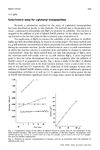 17 citations,
May 2015 in “Nanomedicine: Nanotechnology, Biology and Medicine”
17 citations,
May 2015 in “Nanomedicine: Nanotechnology, Biology and Medicine” Scientists created tiny particles loaded with a hair growth drug, minoxidil, that specifically target hair follicles and skin cells to potentially improve hair growth.
 9 citations,
January 2018 in “Stem Cells International”
9 citations,
January 2018 in “Stem Cells International” Deer antler stem cell fluid helps regenerate tissue better than fat-derived stem cell fluid.
 January 2016 in “International journal of advanced research in chemical sciences”
January 2016 in “International journal of advanced research in chemical sciences” A new method using NBD-CL can accurately and precisely measure finasteride in medicine, and could be used regularly for quality control in the industry.
 11 citations,
June 2013 in “Journal of Chemical Education”
11 citations,
June 2013 in “Journal of Chemical Education” Minoxidil detects nitrite in water, creating a simple, cheap test.
 19 citations,
January 2015 in “Current problems in dermatology”
19 citations,
January 2015 in “Current problems in dermatology” Ultraviolet rays damage hair, smoking may cause hair loss, and good nutrition is important for hair health, but genetics mainly decide hair thickness.
 184 citations,
October 2007 in “Proceedings of the National Academy of Sciences of the United States of America”
184 citations,
October 2007 in “Proceedings of the National Academy of Sciences of the United States of America” Sulforaphane from broccoli can help protect skin from sun damage.
 19 citations,
November 1971 in “Clinica Chimica Acta”
19 citations,
November 1971 in “Clinica Chimica Acta” The document concludes that measuring γ-glutamyl transpeptidase activity is more accurate with a higher substrate concentration and using diluted acetic acid to stop the reaction.
 13 citations,
February 2019 in “Journal of Microencapsulation”
13 citations,
February 2019 in “Journal of Microencapsulation” The pumpkin seed oil niosomes are promising for skin and hair treatments because they are stable and effectively deliver the oil.
 June 2022 in “International Journal of Biomedicine”
June 2022 in “International Journal of Biomedicine” Erbium YAG laser treatment, combined with conventional therapy, can effectively reduce hair loss and promote hair growth in men with androgenetic alopecia.
 25 citations,
July 2019 in “Journal of drug delivery science and technology”
25 citations,
July 2019 in “Journal of drug delivery science and technology” Researchers created better skin-application menthol capsules that are stable, safe, and penetrate the skin quickly.
December 2023 in “Pharmaceutics” The new adhesive nanoparticles are effective for delivering Minoxidil to the scalp without skin irritation.
 57 citations,
February 1994 in “Experimental dermatology”
57 citations,
February 1994 in “Experimental dermatology” Melatonin affects mouse skin and may regulate skin functions.
 2 citations,
September 2020 in “Biomedical materials”
2 citations,
September 2020 in “Biomedical materials” Recombinant keratin materials may better promote skin cell differentiation than natural keratin.
 6 citations,
August 2020 in “Journal of Pharmaceutical Innovation”
6 citations,
August 2020 in “Journal of Pharmaceutical Innovation” Nanoemulgel improves hair growth and quality using finasteride without irritation.
 4 citations,
January 2016 in “Journal of analytical & bioanalytical techniques”
4 citations,
January 2016 in “Journal of analytical & bioanalytical techniques” The herbal hair gel could be a safe hair growth treatment with minimal side effects.

Some plant-based ingredients may help with hair growth and care, but more research is needed to confirm their effectiveness.
 41 citations,
July 2012 in “Stem Cells and Development”
41 citations,
July 2012 in “Stem Cells and Development” Low-dose UVB light improves hair growth effects of certain stem cells by increasing reactive oxygen species.
 62 citations,
January 2004 in “The journal of investigative dermatology/Journal of investigative dermatology”
62 citations,
January 2004 in “The journal of investigative dermatology/Journal of investigative dermatology” A second domain of high sulfur KAP genes on chromosome 21q23 is crucial for hair structure.
 15 citations,
March 2014 in “Biochimica and biophysica acta. Molecular and cell biology of lipids”
15 citations,
March 2014 in “Biochimica and biophysica acta. Molecular and cell biology of lipids” ACBP is essential for healthy skin and fur by maintaining the skin's barrier function.
 August 2017 in “Journal of epidemiological research”
August 2017 in “Journal of epidemiological research” Cancer rates are increasing in developed countries, with estrogen, aging, low vitamin D3, and HPV infection as common causes.
 3 citations,
September 2005 in “Experimental dermatology”
3 citations,
September 2005 in “Experimental dermatology” The cornified envelope is crucial for skin's barrier function and involves key proteins and genetic factors.
 47 citations,
February 2014 in “Aaps Pharmscitech”
47 citations,
February 2014 in “Aaps Pharmscitech” Improved hair loss treatment using special particles and surfactants.
 13 citations,
December 2013 in “Chemistry Central Journal”
13 citations,
December 2013 in “Chemistry Central Journal” Sunlight exposure increases drug toxicity; amber glass best for protection.
 74 citations,
October 1998 in “Journal of biological chemistry/The Journal of biological chemistry”
74 citations,
October 1998 in “Journal of biological chemistry/The Journal of biological chemistry” The 190-kbp domain contains all human type I hair keratin genes, showing their organization and evolution.
 June 2017 in “Experimental and Therapeutic Medicine”
June 2017 in “Experimental and Therapeutic Medicine” The anti-CXCL4 antibody helps mice grow hair faster and prevents hair loss.
 48 citations,
January 2017 in “Skin Pharmacology and Physiology”
48 citations,
January 2017 in “Skin Pharmacology and Physiology” Finasteride-loaded nanoparticles may help treat alopecia.
 101 citations,
October 2013 in “Journal of The Saudi Pharmaceutical Society”
101 citations,
October 2013 in “Journal of The Saudi Pharmaceutical Society” Minoxidil-loaded NLC gel shows potential for effective alopecia treatment.
 1 citations,
January 2017 in “Asian Journal of Chemistry”
1 citations,
January 2017 in “Asian Journal of Chemistry” New method effectively analyzes finasteride and its stability.
 59 citations,
January 2015 in “Nanoscale”
59 citations,
January 2015 in “Nanoscale” The new micelle formulation delivers acne treatment more effectively and safely than current gels.
 26 citations,
May 2017 in “Lasers in Medical Science”
26 citations,
May 2017 in “Lasers in Medical Science” Laser therapy and hair growth factors significantly improve hair density in male baldness.




























